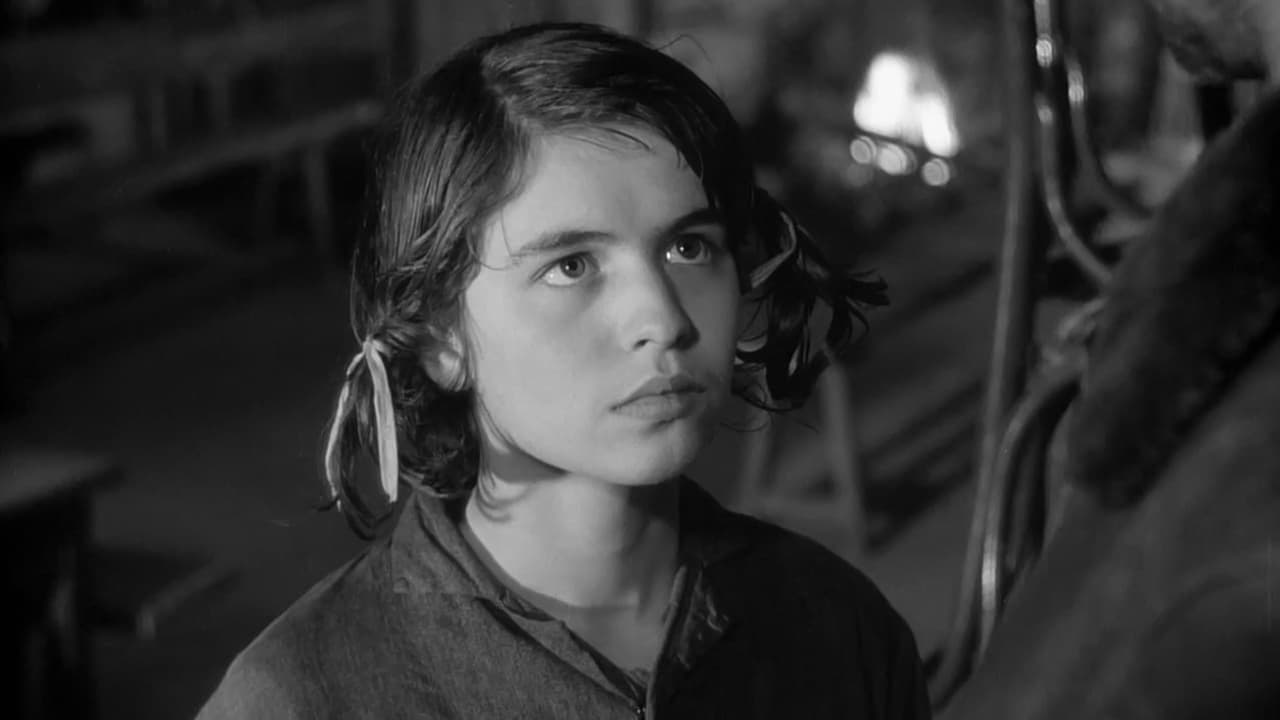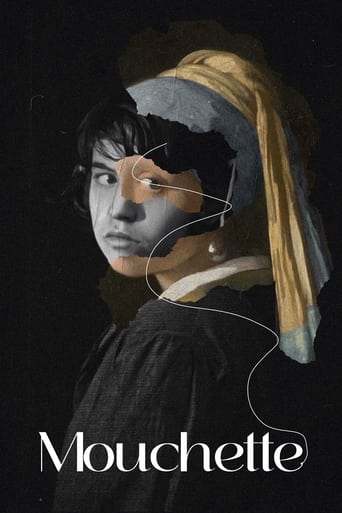

Bresson is known for heartbreaking films such as Au Hasard Balthazar but I believe he got the best of himself with this film. As most of Bresson, the film uses the characters hands and behavior to "explain" them. Mouchette's life is a tragedy: she suffers but yet she will not complain. She has no future, she is a lost person in the world. Even thought Bresson's style may seem too cold, it may be, but it is incredibly affective. Bresson made a film about a tragedy that is not just from this suffered and misunderstood young girl but of a lot of persons: wanting to be accepted but humiliation is what she receives as an answer. "Mouchette" is one of the most powerful films in cinema history, it is moving without being forced and one of the most well developed tragic characters from cinema.
... View MoreAmong the best things that can happen to me as a viewer is to watch a filmmaker grow into mastery, and I've just gone through a series of viewing where Bresson grew before my eyes. He wasn't a master before Balthazar in my estimation but he was one now.See, he had started with ambitious work in Diary of a Priest, but something must have troubled him, the spiritual search was coming off as emotional anguish, resulting in sentimentality. His next three were all about finding ways to quell this, fasting the eye, muting the emotion. This is all the more reason to celebrate him, because it could have gone either way. He could have turned out film after film where he mutes expression and turns actors into bare stumps and called it pure. But if this was purity, where was the life in which the pure is woven through? Bresson matters I believe because he left the stone floor of his ascetic phase to grow into this, his sculpting phase.This is a sculpture of moving image and sound, even more so than Balthazar, even more purely about the rooms and spaces in which a young girl faces the duplicity of life. It's all in how he chisels the air with the camera, he does this in three parts. The day before, with its moments of small everyday cruelty and unexpected kindness alike. She has a beautiful voice but won't sing with her classmates until forced, a passing woman unexpectedly gives her money for the bumping cars, but her dalliance with a boy is cut short and she has to go sit with her father. It's heart-aching because all she needs is someone to mind her and no one does outside of making her behave how they want to, most of us have been savaged this way as kids.The night of unfathomable emotions out in the woods, and look how masterfully. Why she does what she does in the cabin, why she swears to protect his secret and professes love, perhaps intuitively protecting herself, perhaps asserting herself against authority, this is all as unfathomable as why the man goes back out to commit violence. It's all in that shot where the two men laugh, for no reason other than all this being absurd, beneath a dark sky, and the wind that blows all through the night.In the third part of the film we have the day after, with this complicated human nature brought to the stark light of what other people think. Bresson shows us judgment and cynicism, and even the old woman's advice about death is waved off; too musty for a young girl, more advice.So how poignant to see this shift in Bresson? He gives us by the end a more eloquent Jeanne D'arc, now the dogmatist interrogators become your small-minded neighbors and Joan is neither pure nor certain in any way about the truth of what she experienced. No ceremonial death. And how deep it cuts, that she may have wanted to ask her mother for advice, unburden the confusion, but has to go through it alone.So after a series of Bresson viewings, I will come to rest here. Antonioni would take home the Palm that year but Bresson had conquered his obstacles and arrived fully. The title of Tarkovsky's book best describes what he does here, and you can see the Tati influence as a new tool that he didn't have back in Pickpocket. He sculpts an external time, but now in such a way that the pure is found where it grows roots and rustles, among life.It would be Tarkovsky's turn now to shoulder this legacy, and Dreyer's, asking himself, what kind of time? We dream and yearn with an asymmetric logic and mingle with our reflection. It would be one of the great leaps in the cinema but for that we'd have to go forward.
... View Moremouchette may have been ruined for me by the jean luc godard "cut" trailer that i watched on the DVD before watching the film. this trailer demonstrates and exaggerates the pornographic aspects of the film. the film is much less sensational than the trailer suggests, but there is that aspect of it. for example, it was not necessary to film schoolgirls swinging upside down on a playground, flashing their panties. it's not outrageous when you see it in context, in the film - rather it is as un-pornographic as that subject could be. but after seeing the godard trailer it is hard not to see the whole film through his eyes, and hear as if from a fellow viewer, perverted snickering during each such scene.i disagree with the IMDb commentator who claims the "one happy scene" of the movie to be boring and lifeless. the bumper car scene is brilliant. the entire time (it is a drawn out scene) i was thinking, "why have i never seen a bumper car scene?" and "what an interesting social dynamic bumper cars are." aside from entertaining, it alone also shows that mouchette is a regular girl, and not always a victim.i prefer A MAN ESCAPED and PICKPOCKET. these are the only 3 bresson films i've seen.
... View MoreSixteen years after having successfully exploited Georges Bernanos' universe for his "Journal d'Un Curé De Campagne" (1951), Robert Bresson appropriates once again another book by the French writer: "Mouchette" for a very personal, stylish rendering and a canonical film about stolen childhood. The filmmaker always supported that he'd prefer a film to be felt rather than to be understood. Needless to say we leave the projection with a big emotion inside us and we also feel helpless about Mouchette' terrible life. According to Bresson, Mouchette's tragic fate enabled him to put forward "misery, cruelty. They're everywhere: wars, tortures, murders".The film starts with Arsène's and the gamekeeper's eyes staring at quails and partridges that desperately try to free themselves from snares. This harrowing introduction sequence sets the scene for what follows after wards. How not to think of a metaphor for Mouchette's life that offers her no horizon and no hope? This teenage girl is all alone and in spite of her young age, she has to take care of her sick mother, her alcoholic father and her baby brother. She goes to school but feels rejected by her female fellow students, notably when school's over, they stone her. It's the same thing every day and Mouchette is trapped in her loneliness. That's why the sequence at the fair comes as a sort of relief for her. The scene at the bumper cars provides her momentary solace and joy. Then, the key sequence with Arsène will make her open her eyes about what she really wants. In spite of her poverty and solitude, Mouchette needs to love but where to find it in a hostile world?Mouchette strongly belongs to the Bressonian world. She's an outcast and she can't integrate herself to her surrounding. Once again, Bresson underscores the opposition between a pure, subjective person and an objective, hostile world in a sparse, minimal directing with a supremacy granted to images and sounds and the evident symbols they convey. An eloquent example would be when the little girl is all alone in the country and can hear the sound of guns and can see rabbits running or dying. She hasn't got a friend or even one member of her family to talk to. When she wants to tell her mother what Arsène did to her, she dies. Fate dogs her. There's no room for the weak and there's one last exit left... Bresson's austere, intensely visual making fits the story and its themes like a glove and if you don't feel anything during the last sequence, you have a heart of stone.
... View More